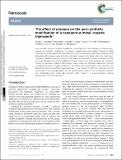The effect of pressure on the post-synthetic modification of a nanoporous metal-organic framework
Abstract
Here we report four post-synthetic modifications, including the first ever example of a high pressure-induced post-synthetic modification, of a porous copper-based metal-organic framework. Ligand exchange with a water ligand at the axial metal site occurs with methanol, acetonitrile, methylamine and ethylamine within a single-crystal and without the need to expose a free metal site prior to modification, resulting in significant changes in the pore size, shape and functionality. Pressure experiments carried out using isopropylalcohol and acetaldehyde, however, results in no ligand exchange. By using these solvents as hydrostatic media for high-pressure single-crystal X-ray diffraction experiments, we have investigated the effect of ligand exchange on the stability and compressibility of the framework and demonstrate that post-synthetic ligand exchange is very sensitive to both the molecular size and functionality of the exchanged ligand. We also demonstrate the ability to force hydrophilic molecules into hydrophobic pores using high pressures which results in a pressure-induced chemical decomposition of the Cu-framework.
Citation
McKellar , S C , Graham , A J , Allan , D R , Haja Mohideen , M I , Morris , R E & Moggach , S A 2014 , ' The effect of pressure on the post-synthetic modification of a nanoporous metal-organic framework ' , Nanoscale , vol. 6 , no. 8 , pp. 4163-4173 . https://doi.org/10.1039/c3nr04161a
Publication
Nanoscale
Status
Peer reviewed
ISSN
2040-3364Type
Journal article
Description
This work is supported by funding from the EPSRC UK and the Leverhulme TrustCollections
Items in the St Andrews Research Repository are protected by copyright, with all rights reserved, unless otherwise indicated.

